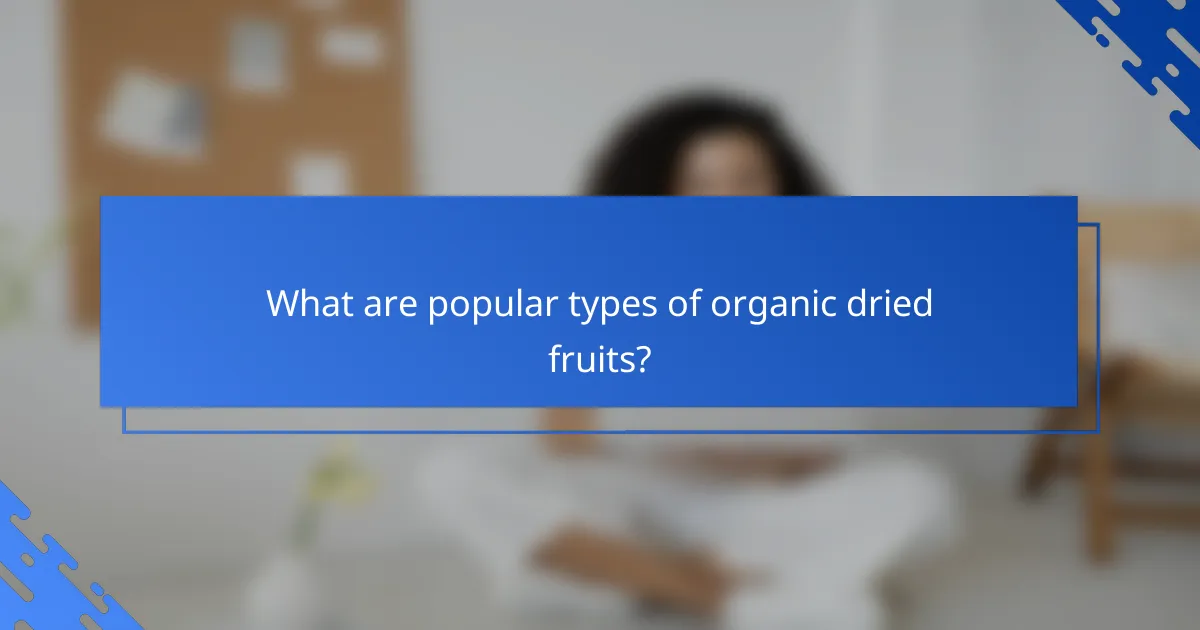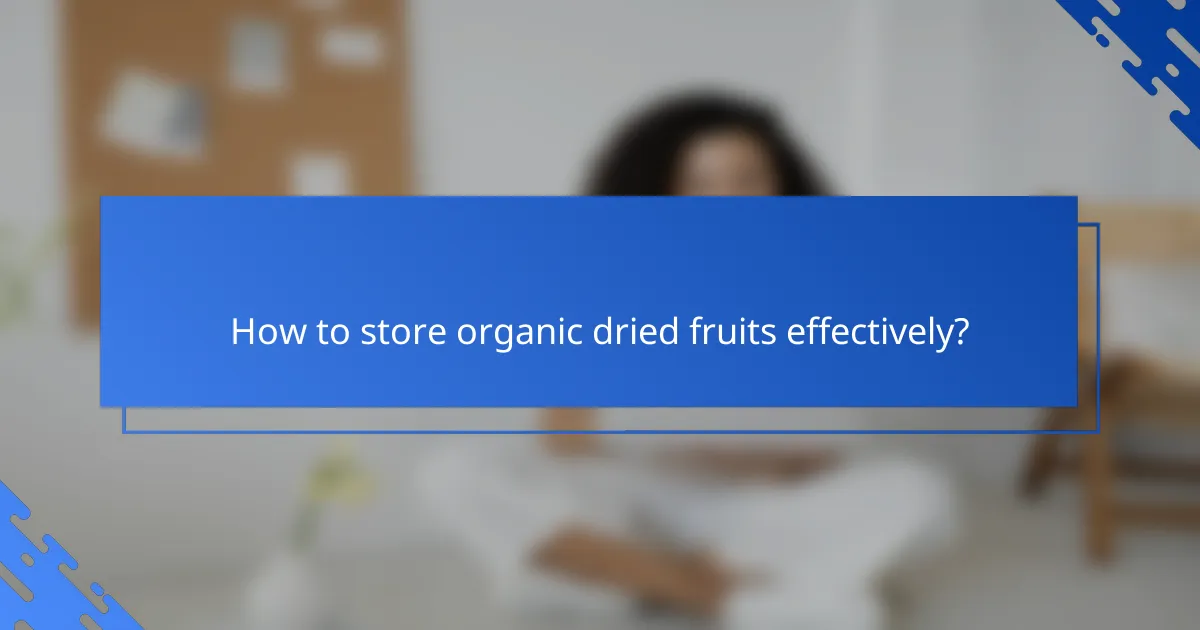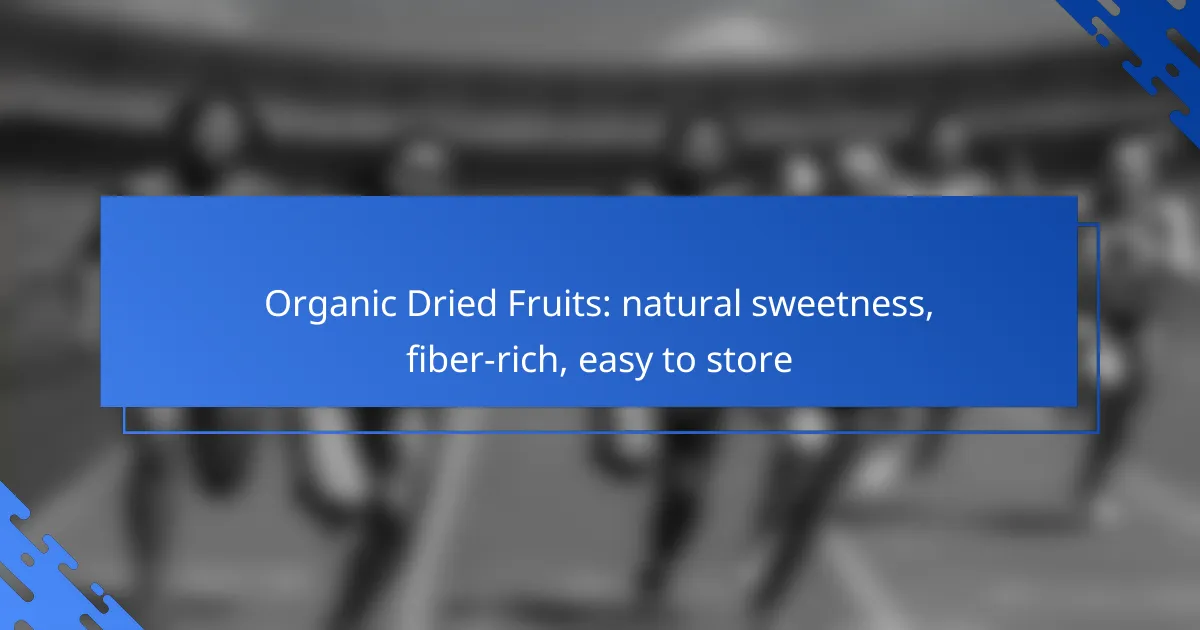Organic dried fruits are a delicious and nutritious snack, packed with natural sweetness and high fiber content. They are easy to store, making them a convenient option for those seeking healthy choices in their diets. With a variety of options like apricots, figs, and mangoes, these fruits offer both flavor and health benefits in every bite.

What are the benefits of organic dried fruits?
Organic dried fruits offer numerous benefits, including natural sweetness, high fiber content, and convenience in storage. They are a nutritious snack option that can easily fit into various diets and lifestyles.
Natural sweetness
Organic dried fruits are naturally sweet, making them a healthier alternative to processed snacks. Their concentrated sugars provide a quick energy boost, which is ideal for athletes or anyone needing a pick-me-up during the day.
Common options like dried apricots, figs, and dates can satisfy sweet cravings without added sugars or artificial ingredients. This natural sweetness enhances their appeal for both children and adults.
High fiber content
Organic dried fruits are rich in dietary fiber, which aids digestion and promotes gut health. A serving can provide a significant portion of the daily fiber intake recommended for adults, helping to maintain regular bowel movements.
Incorporating fiber-rich dried fruits like prunes or raisins into your diet can help manage weight by promoting a feeling of fullness. This can reduce the likelihood of overeating during meals or snacking.
Convenient storage
One of the key advantages of organic dried fruits is their long shelf life. They can be stored in a cool, dry place for several months, making them a practical choice for stocking up on healthy snacks.
Unlike fresh fruits, which can spoil quickly, dried fruits are easy to transport and require no refrigeration. This makes them perfect for on-the-go snacking or adding to meals without the worry of spoilage.
Rich in nutrients
Organic dried fruits retain many of the nutrients found in their fresh counterparts, including vitamins, minerals, and antioxidants. For example, dried apricots are a good source of vitamin A, while raisins provide iron and potassium.
These nutrients contribute to overall health, supporting immune function and reducing the risk of chronic diseases. Choosing organic options can further ensure that these fruits are free from harmful pesticides and additives.
Versatile uses
Organic dried fruits can be enjoyed in various ways, making them a versatile ingredient in the kitchen. They can be added to cereals, salads, or baked goods for extra flavor and texture.
Additionally, they can be blended into smoothies or used as natural sweeteners in recipes. Their adaptability allows for creative culinary uses, enhancing both sweet and savory dishes.

How to choose the best organic dried fruits?
To choose the best organic dried fruits, look for products that are certified organic, contain minimal additives, and are packaged properly to maintain freshness. These factors ensure you are getting high-quality, nutritious options that retain their natural sweetness and fiber content.
Check for certifications
When selecting organic dried fruits, verify that they have recognized certifications, such as USDA Organic or EU Organic. These certifications indicate that the fruits have been grown without synthetic pesticides or fertilizers, ensuring a healthier product.
Look for labels that specify the standards met, as this can vary by region. In the U.S., for example, the USDA seal is a reliable indicator of organic integrity.
Look for minimal additives
Choose dried fruits that contain no added sugars, preservatives, or artificial flavors. Ideally, the ingredient list should be short, often just listing the fruit itself.
Some common additives to avoid include sulfur dioxide, which is used as a preservative, and added sweeteners. Opting for products labeled as “unsweetened” can help you avoid these extras.
Consider packaging
Packaging plays a crucial role in preserving the quality of organic dried fruits. Look for resealable bags or vacuum-sealed containers that protect against moisture and air exposure.
Additionally, consider the material of the packaging. Eco-friendly options, such as biodegradable or recyclable materials, can be a more sustainable choice while still providing adequate protection for the fruits.

What are popular types of organic dried fruits?
Popular types of organic dried fruits include apricots, figs, raisins, and mangoes. These fruits are not only naturally sweet but also rich in fiber, making them a healthy snack option that is easy to store and enjoy.
Organic dried apricots
Organic dried apricots are known for their vibrant orange color and sweet flavor. They are an excellent source of vitamins A and C, as well as dietary fiber, which aids digestion.
When selecting organic dried apricots, look for those that are unsweetened and free from preservatives. They can be enjoyed on their own, added to trail mixes, or used in baking.
Organic dried figs
Organic dried figs are chewy and sweet, packed with nutrients like calcium, potassium, and antioxidants. They are particularly high in fiber, making them beneficial for gut health.
These fruits can be eaten raw, added to salads, or incorporated into savory dishes. When purchasing, choose figs that are plump and moist, avoiding those that appear hard or overly dry.
Organic raisins
Organic raisins are dried grapes that come in various varieties, including Thompson seedless and sultanas. They are a convenient snack, rich in iron, potassium, and antioxidants.
Raisins can be used in baking, sprinkled on cereals, or enjoyed straight from the package. Opt for organic options to avoid added sugars and sulfites, which can be found in non-organic varieties.
Organic dried mango
Organic dried mango offers a tropical sweetness and is rich in vitamins A and C. This fruit is a great source of dietary fiber and can satisfy sweet cravings in a healthier way.
When choosing organic dried mango, look for products without added sugars or artificial flavors. They can be enjoyed as a snack, added to smoothies, or used in salads for a burst of flavor.

Where to buy organic dried fruits online?
You can purchase organic dried fruits online from various reputable retailers that specialize in natural and health-focused products. These platforms often provide a wide selection, competitive pricing, and convenient delivery options.
Amazon
Amazon offers a vast array of organic dried fruits from numerous brands, making it easy to compare prices and read customer reviews. You can find everything from dried apricots to mango slices, often available in bulk for better savings.
When shopping on Amazon, look for products labeled as “certified organic” to ensure quality. Prime members may also benefit from free shipping options, enhancing the convenience of your purchase.
Thrive Market
Thrive Market is a membership-based online grocery store that focuses on organic and non-GMO products, including a variety of organic dried fruits. Membership provides discounts on many items, making it a cost-effective option for health-conscious shoppers.
Thrive Market often features exclusive brands and bulk purchasing options, which can lead to significant savings over time. Consider checking their seasonal sales for additional discounts on popular dried fruits.
Whole Foods Market
Whole Foods Market’s online store allows customers to order organic dried fruits for delivery or pickup. Known for its commitment to quality, Whole Foods ensures that its dried fruits meet strict organic standards.
Shopping through Whole Foods can be slightly more expensive than other retailers, but the quality and sourcing transparency may justify the price. Additionally, you can often find local delivery options through their website or affiliated services.

How to store organic dried fruits effectively?
To store organic dried fruits effectively, keep them in a cool, dark, and dry place. Proper storage helps maintain their flavor, texture, and nutritional value over time.
Optimal storage conditions
The best storage conditions for organic dried fruits involve low humidity and stable temperatures. Aim for a temperature range of 15-20°C (59-68°F) and humidity levels below 60%. This prevents moisture from causing spoilage or mold growth.
Use airtight containers, such as glass jars or vacuum-sealed bags, to protect dried fruits from air exposure. This minimizes oxidation and helps retain their natural sweetness and fiber-rich qualities.
Long-term storage tips
For long-term storage, consider freezing organic dried fruits. Freezing can extend their shelf life significantly, often up to a year or more. Ensure they are well-packaged in freezer-safe containers to prevent freezer burn.
Label containers with the date of storage to keep track of freshness. Regularly check for any signs of spoilage, such as off odors or changes in texture, to ensure quality.
Common mistakes to avoid
Avoid storing dried fruits in direct sunlight or near heat sources, as this can degrade their quality. Do not use non-airtight containers, which can lead to moisture absorption and spoilage.
Be cautious with bulk purchases; while buying in larger quantities can be economical, ensure you have adequate storage space and conditions to maintain freshness. If unsure, opt for smaller amounts that can be consumed within a few months.










